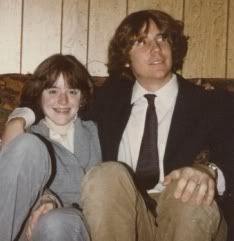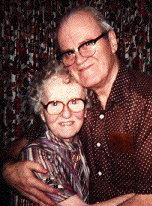The non-specific longing that engulfed me at age 15 remains the most sustained spasm of feeling I have ever experienced. I had always been prone to crushes and flights of fantasy, but as my freshman year of high school commenced, I became a heat-seeking boyfriend missile--only, my guidance system was completely off. The resultant frustration and loneliness were 24-hours-and-7-days challenging.
I expended a lot of energy imagining the scenarios that would result in BOYFRIEND. Every school-dance poster brought a surge of hope--although my stepfather held the keys to my fate there, as he would capriciously decide whether I could go or not. Usually, he said that I couldn't. Since these dances involved a nighttime subway trip from Queens to NYC and back, I could understand, even when his decision devastated me. And even when I did go, I pressed my back against the wall and observed blocky movements out on the floor, mentally beating myself for being a non-entity.
By sophomore year, I'd crafted a master plan of sleepovers at my friend Alexandra's house that released me into the latenight Manhattan New York
One problem was, I had absolutely no idea what I would do to said elusive boyfriend if I got my trembling hands on him. I had long since received the stone tablets of the facts of life, handed down by my mother when I was in fourth grade. (Bless her for understanding that I was intellectually ready and thirsty to know.) I consumed young-adult romances like they were self-help books. I certainly understood that there was kissing, and then there was kissing. I knew a boy's trembling hands would start wandering around my shirt front at some point, once kissing commenced. And I had read plenty about the post-foreplay penetration...an activity so mind-blowingly absurd that I dismissed it from any considerations. At any rate, these physical movements existed in a black box of actual sensation. So, essentially, I desperately craved a black box.
I did think I knew what it would feel like to have a constant companion--a love sidekick--who would share my interests, praise my music choices, laugh with me, read my writing, and sling an arm around my back when I wasn't expecting it, to remind me that I finally existed in a circle. I belonged. Perhaps this was a lot to load on the average teenage boy.
Perhaps it wasn't.
Reader, I met him. In the most mundane place: French class. He sat alongside me--assigned seats--and for months I had taken notice of his longish light-brown hair that curled despite any efforts to comb it, the relative heft of his shoulders inside the navy-blue blazer we all had to wear, the stylish corduroys (1979, remember) and the smiling eyes behind big aviators (again, 1979). One day I took notice of something far more revelatory: he had doodled Yes on his notebook. The band name. In its logotype.
This, I could launch a conversation out of. For which I must be eternally grateful to my brother, the music fanatic, who had long since infected me with encyclopedic knowledge and my-band's-better-than-yours attitude.
"Rob," I said casually, "you like Yes?"
He turned left and met my gaze. "Yeah!" he said eagerly. "Seen them a few times live, in fact. They're incredible. [Insert an excited discourse about their elaborate stage set, which I listened to indulgently.] Why, do you like them?"
I tilted my head in somewhat-assent. "Yeah," I said. "But Genesis is better."
His eyes popped. Really, they did. Score. Rob's response was a diatribe that included words like "sucks." Thus raising my hackles. And for weeks after, we traded barbs about Genesis versus Yes, making escalating claims of superiority based on music that we had rushed home to listen to the night before. A spiraling keyboard solo here, a particularly inspiring vocal there. Guitar prowess. Drum dominance. All delivered to each other across the bow of our French desks, with the slightest twinkle in our eyes.
As the dialogue continued, we both started making concessions about the other's favorite, because I was popping in my brother's Yes tapes for comparative purposes, and Rob had taken to analyzing Genesis as closely as Yes. So I became familiar with many of Yes' charms, Rob developed serious fondness for Genesis, and our arguments morphed into encouragements.
Most importantly, all this prog rock gave final shape to my burgeoning sense of romance. Cool water on the hot rocks of my wanting. These bands did everything BIG, with ebbs and swells of sound, and lyrics at once obscure and emotionally charged. I felt championed and supported by this music; long nights alone in my room were less desolate.
It would be untrue to say that the Genesis-Yes Wars (as Rob and I came to refer to them) were an instant guarantor of romance. No, it took an agonizing year for that to happen. Turns out that Rob was as constrained by inexperience and urgency as I was. But we forged a friendship that ranged beyond music, got to know each other's quirks (plenty on both sides), made each other laugh all the time...became companions. Finally, in the spring of 1980, Rob's friend Larry--an everlasting sparkplug, one of the funniest people I've ever known--became impatient with all of this mooning in the guise of friendship. He prodded Rob to take action, even gave him careful instructions--just as my friends began insisting that I had to do something (because they were dog-tired of hearing me moan about it). And they were right: I had taken to making journal entries in grey marker, for God's sake, to reflect the hopeless that wrapped around me. Besotted poetry excerpt from said journal:
a journey into the center of your eyes takes me
farther into myself than I'd ever believed was possible...
joins your dreams with mine
and makes them all come true
and makes your thoughts my words...
A pounding in my head: Rob, Rob, Rob. And yet every day I hung out with him cheerfully, never giving voice to anything I was feeling.
I always figured that a boy would ask me out under cover of darkness. Hence my frequent engineering of sleepovers, so I could make myself available for the big mo. Yet Rob chose full-on afternoon, in Central Park... a place we had been together many, many times, just two blocks from our school. In fact, the Park was the refuge for those of us who despised the sweaty drill of gym class. Improbably, instead of gym, we dissenters were allowed to go to the Park without a teacher and jog. (I know, it strains the imagination, doesn't it? So 20th century.) A ragtag band of about eight kids would bang out of the gym doors, blinking in sudden sunshine, and head two blocks west. Once the Park's majestic treetops became visible, a subgroup of stoners would veer off to the right, and the rest of us would go to the Reservoir and make some attempt to plod faster than usual around a wide oval. Rob and I used this time for deep conversations, which would start to get breathless until we gave up on trotting and returned to sensible walking.
That fateful day, spring had overswept the city, dressing its greys in ballgowns of blossoms. As we half-jogged, Rob and I engaged in a strange, stilted conversation about the idea of going out as we walked the Park paths. I don't think I overwhelmed him with enthusiasm, because a) I was constricted with nerves, and b) I had finally learned something about not scaring off my prey. After the words had been released, rendering us boyfriend and girlfriend in name only, we returned to school--gym was the last class of the day. Once we had changed clothes and the final bell rang by the lockers, Rob and I reconvened and headed for 86th Street
For an hour now, ever since the conversation, I'd felt like a newborn--overwhelmed by the everyday. Now everything was different in the context of everything being the same. I wondered if I would feel this way forever, until Rob snapped me out of it. At the mouth of the station on 86th and Lex--where streams of people crisscross on the sidewalk, either heading down into the subway, or coming up from it--he stopped me by touching my arm, and then he delivered one electric kiss right there where we stood. My lips tingled with the jolt. As we took the grimy steps downward, I didn't feel the impact under my feet. Perhaps I really was floating.
Why am I reliving this? Well, last Thursday, Genesis was issued some kind of Rock Honors thing from VH1. Now, 27 years after I championed them between filmstrips in French class, they are being acknowledged as innovators, masters, leaders. No matter. They were all of those things for me back then, and as the VH1 broadcast brought the full range of their music to the masses, I sat back on the sofa, overspread with the heady, painful confusion and the final sweet payoff of 1980.
Tune in next time for: How Alcohol Led to Kissing. 





